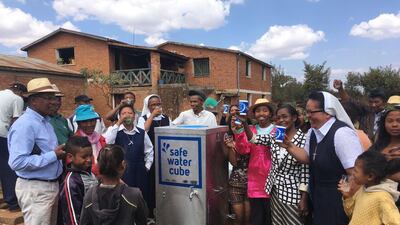A "solar suitcase" that brings light to expectant mothers in remote areas, an organisation that helps millers fortify their flour to combat malnutrition and a purification system that gives communities clean water are among the sustainable solutions that will be exported across the world — with the help of the UAE.
Twenty projects, awarded funding by the Zayed Sustainability Prize over the past decade, will be replicated in far-flung communities around the world to give more people access to sustainable and potentially life-changing services.
Launched on Wednesday, the 20by2020 initiative aims to establish 20 of these projects in 20 developing countries by the end of next year.
“We are not a prize that only awards and ends their job there and waits for the new cycle,” said Dr Sultan Al Jaber, UAE Minister of State and director general of the Zayed Sustainability Prize.
“We make sure that, through the very rich database we were able to establish over the years, we match prize winners with communities who are in need of their products.”
On Wednesday, it was revealed that a solar light project that won funding in 2018 for installing solar street lamps in Rohingya refugee camps in Cox's Bazaar, Bangladesh, had begun exporting their technology to Jordan and Egypt.
Sunna Design, a French company, is installing solar street lights outside Prince Hamza Hospital in Amman, benefiting 3,000 people, and at the Habisha Village located in the Asyut Governate of Egypt, benefiting 3,500 people. The lights should be ready within three months.
The Safe Water Cube project, which provides clean, drinkable water to communities through fountains will also export its technology to three villages in Cambodia.
More than 5,000 people living in Preak Toal, Meat Khlar and Peak Kanteal are expected to benefit, while water purifiers are set to be installed in Madagascar — aiding 5,000 citizens.
Ahmed Al Sayegh, Minister of State and Chairman of Abu Dhabi Global Market — a partner in the 20by2020 initiative — said that, if successful, the initiative would continue beyond next year.
“Today we chose 10 solutions but we have hundreds of solutions,” he said.
Though the solutions to these worldwide problems may seem simple, their effect on communities is widespread.
The solar suitcases, created by this year’s prize winner We Care Solar, have been distributed to expectant mothers in remote areas of Haiti and countries in Africa so they may deliver their babies safely.
“In the UAE and many countries, when it is time for delivery we take it for granted that there are hospitals all around,” said Mr Al Sayegh.
But in remote areas, women could die during labour because of a lack of light.
Under the new initiative, the suitcases will be delivered to health facilities in Nepal’s Bhojpur and Sankhuwasabha districts, as well the city of Ntinda in Kampala, Uganda.
The suitcases are expected to help 6,000 mothers and babies in Nepal and a further 12,000 women and children in Uganda.
The 2020 winners of the Zayed Sustainability Prize will be announced during Abu Dhabi Sustainability Week next month.
To date, 76 winners have been awarded the prize, and $600,000 (Dh2.2 million) in funding. The prize has helped more than 318 million people worldwide since it launched in 2008.


